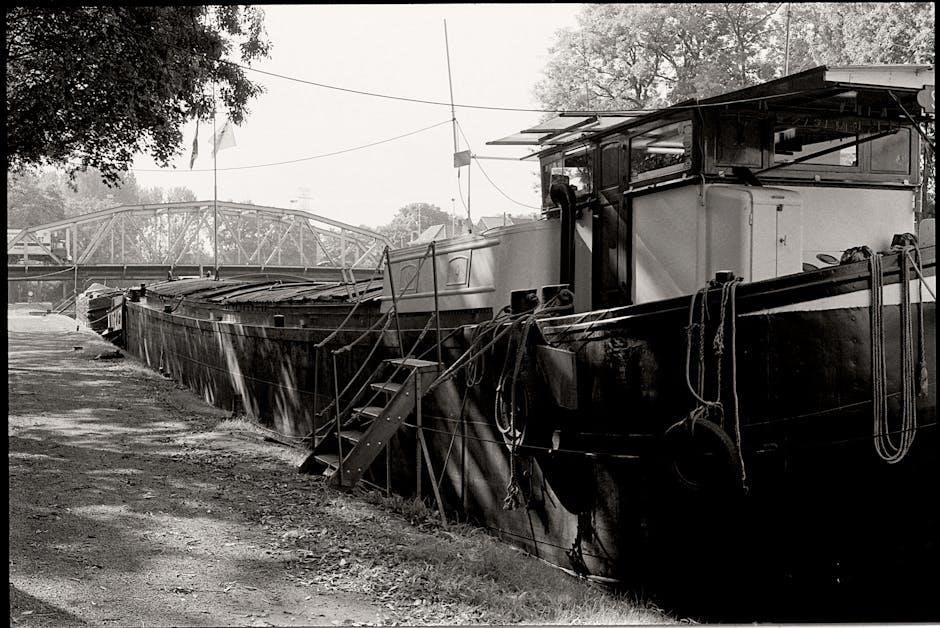Robert Fagles’ translation of The Odyssey is a groundbreaking work, blending scholarly precision with accessible prose․ This rendition captures Homer’s epic tale of Odysseus’ journey, balancing fidelity to the original Greek text with a modern, lyrical voice․ Fagles’ version, part of the Penguin Classics Deluxe Edition, is celebrated for its clarity and emotional depth, making it a preferred choice for both academics and general readers․ The inclusion of Bernard Knox’s insightful introduction and notes further enhances its educational value, offering a comprehensive understanding of this ancient masterpiece․
Significance of Robert Fagles’ Translation
Robert Fagles’ translation of The Odyssey stands out for its masterful blend of literary artistry and scholarly fidelity․ His work bridges the gap between ancient Greek and modern English, making Homer’s epic accessible to a broad audience while preserving its poetic richness․ Fagles’ translation is praised for its clarity, emotional depth, and ability to capture the essence of Odysseus’ journey․ It has become a cornerstone in classical literature studies, offering readers a fresh yet faithful interpretation of Homer’s timeless tale․ The PDF version, widely sought after, ensures this exceptional translation remains a vital resource for scholars and enthusiasts alike․
Overview of The Odyssey’s Structure
The Odyssey, translated by Robert Fagles, is structured into 24 books, each focusing on key events in Odysseus’ journey․ The narrative is divided into two main parts: the Telemachy, detailing Odysseus’ son’s search for his father, and Odysseus’ own odyssey, recounting his trials and return to Ithaca․ The poem explores themes of homecoming, identity, and divine intervention, with pivotal episodes like the Cyclops, the Sirens, and the underworld․ Fagles’ PDF version preserves these structural elements, ensuring readers engage with Homer’s original framework while benefiting from a modern, accessible translation that enhances comprehension of this ancient epic․

Robert Fagles’ Background and Contributions
Robert Fagles, a renowned Princeton professor, translated Homer’s epics with scholarly depth and poetic flair․ His work, including The Odyssey, remains a cornerstone of classical literature studies․
Biography of Robert Fagles
Robert Fagles was a distinguished scholar and translator, best known for his translations of classical epics․ Born in Philadelphia, he taught comparative literature at Princeton University․ Fagles’ translations of Homer’s The Iliad and The Odyssey, as well as Virgil’s The Aeneid, are celebrated for their lyricism and accessibility․ His work bridged the gap between academia and general readers, making ancient texts relatable․ Fagles received numerous accolades for his contributions to classical literature․ He passed away in 2008, leaving a legacy as one of the most influential translators of his time․
His Approach to Translating Classical Works
Robert Fagles’ approach to translating classical works emphasized balancing fidelity to the original text with a modern, poetic voice․ He sought to capture the essence and emotional depth of Homer’s epics while making them accessible to contemporary readers․ Fagles avoided literal translations, instead opting for a lyrical prose that conveyed the spirit of the original Greek․ His meticulous attention to detail and deep understanding of classical contexts ensured that his translations remained both scholarly accurate and engaging․ This approach earned his versions of The Iliad and The Odyssey widespread critical acclaim and popularity․

Key Features of The Odyssey PDF
The Odyssey PDF by Robert Fagles offers scholarly accuracy and accessibility․ It includes Homeric line numbers, enhancing its educational value․ Ideal for both students and scholars․
Accessibility and Scholarly Accuracy
Robert Fagles’ translation of The Odyssey masterfully balances accessibility with scholarly rigor․ His prose is clear and engaging, making Homer’s epic accessible to modern readers while preserving the poetic depth and complexity of the original Greek․ Fagles’ approach ensures that the text remains faithful to Homer’s intent, yet resonates with contemporary audiences․ This dual focus on readability and academic integrity makes it a valuable resource for both students and scholars, ensuring that the essence of the ancient epic is maintained without sacrificing clarity or emotional impact․
Inclusion of Homeric Line Numbers
The PDF version of Robert Fagles’ The Odyssey features the inclusion of Homeric line numbers, a crucial element for scholarly reference․ These line numbers align with the traditional Greek text, allowing readers to cross-reference passages and engage in deeper analysis․ This feature is particularly valuable for students and researchers, as it facilitates comparison with other translations and critical studies․ The retention of these line numbers in the PDF ensures that the academic integrity of the work is maintained, making it an indispensable tool for both educational and literary purposes․
Downloading The Odyssey by Robert Fagles
The PDF of The Odyssey translated by Robert Fagles is widely available for download․ Platforms like lib․org offer free access, while authorized sellers provide secure purchases․
Legal Sources for the PDF
Obtaining The Odyssey by Robert Fagles legally ensures quality and supports creators․ Authorized platforms like lib․org, Penguin Classics, and academic databases offer secure downloads․ The Penguin Classics Deluxe Edition (ISBN 978-0-14-026886) is a reliable source․ Purchasing or downloading from these platforms guarantees an authentic, high-quality version, often with introductions and notes by scholars like Bernard Knox․ Avoid illegal downloads to respect copyright and support literary preservation․ Legal access also provides assurance of accuracy and completeness, making it the preferred choice for scholars and readers alike․
Importance of Using Authorized Platforms
Using authorized platforms to access The Odyssey by Robert Fagles ensures a legitimate and high-quality reading experience․ These platforms provide accurate translations and proper formatting, essential for scholarly work․ They support authors and publishers, promoting literary preservation․ Unauthorized downloads risk exposing users to malware and incomplete texts․ Legal access through platforms like Penguin Classics or academic databases guarantees authenticity and contributes to the sustainability of literary works․ Choosing authorized sources respects intellectual property and ensures a reliable, engaging experience for readers and researchers alike․

Structure and Content of The Odyssey
The Odyssey, translated by Robert Fagles, is divided into 24 books, chronicling Odysseus’s journey home․ Themes of perseverance, loyalty, and destiny are woven throughout․ The epic poem explores Odysseus’s trials and triumphs, while Fagles’ translation preserves Homer’s poetic essence, making the ancient tale resonate with modern readers․
Breakdown of the Books in The Odyssey
The Odyssey, translated by Robert Fagles, is structured into 24 books, each detailing a segment of Odysseus’s journey․ The narrative begins with the Council of the Gods and Telemachus’s search for his father, setting the stage for Odysseus’s eventual return․ Early books focus on Telemachus’s adventures and Odysseus’s captivity by Calypso․ The midpoint introduces Odysseus recounting his encounters with mythical creatures like the Cyclops and sirens․ The final books depict his return to Ithaca, reunification with Penelope, and confrontation with suitors․ Fagles’ translation maintains the poetic essence while enhancing readability․
Major Themes and Motifs
Robert Fagles’ translation of The Odyssey vividly explores themes of homecoming, perseverance, and identity․ Odysseus’s journey embodies the human struggle against fate and the pursuit of destiny․ The motif of hospitality highlights societal expectations, while the clash between divine intervention and human agency underscores the complexity of free will․ Fagles’ lyrical prose amplifies the epic’s emotional depth, making these timeless themes resonate with modern readers․ His translation captures the hero’s cunning and resilience, emphasizing the enduring relevance of Odysseus’s quest in a world shaped by both mortal and immortal forces․
Reception and Reviews
Robert Fagles’ translation of The Odyssey has received widespread critical acclaim for its accessibility and scholarly depth, significantly influencing classical literature studies and reader engagement․
Critical Acclaim for Fagles’ Translation
Robert Fagles’ translation of The Odyssey has garnered widespread critical acclaim for its masterful blend of scholarly accuracy and lyrical prose․ Reviewers praise its accessibility, ensuring that Homer’s epic resonates with both academics and general readers․ Fagles’ ability to preserve the poetic essence of the original Greek while rendering it in modern, flowing English has been particularly lauded․ His work is celebrated for bridging the gap between classical scholarship and contemporary readability, making it a benchmark in literary translation․ This translation has not only revitalized interest in Homer’s masterpiece but also set a new standard for interpreting ancient texts․
Impact on Classical Literature Studies
Robert Fagles’ translation of The Odyssey has profoundly influenced classical literature studies by making Homer’s epic more accessible to modern readers․ His work bridges the gap between academic rigor and readability, inspiring new generations of scholars and enthusiasts․ Fagles’ approach has set a benchmark for translating ancient texts, emphasizing both fidelity to the original and poetic expression․ This has led to a renewed interest in classical literature, fostering deeper engagement with Homer’s themes and motifs․ His translation has become a cornerstone in academic curricula, shaping how The Odyssey is studied and appreciated today․

Additional Resources and Guides
Companion materials, including study guides and online forums, complement Fagles’ translation, offering deeper insights and analysis․ These resources enrich the reading experience and aid understanding of Homer’s masterpiece․
Companion Materials for Study
Various study guides and resources accompany Fagles’ translation, providing deeper insights into The Odyssey․ These materials include detailed analyses, historical context, and interpretative essays․ Bernard Knox’s introductions and notes in the Penguin Classics edition offer scholarly perspectives, while online forums and educational websites provide additional commentary․ These tools are invaluable for students and readers seeking to explore the epic’s themes, motifs, and cultural significance․ They enhance understanding and appreciation of Fagles’ work, making the study of The Odyssey more engaging and comprehensive․
Online Communities and Discussions
Online communities and forums offer vibrant spaces for discussing Robert Fagles’ translation of The Odyssey․ Platforms like Reddit and academic discussion boards host lively debates about the text, its themes, and Fagles’ interpretative choices․ Many users share insights, study guides, and analyses, fostering collaborative learning․ These communities often provide links to downloadable PDF versions of the book, alongside commentary from scholars and enthusiasts․ Discussions frequently highlight the balance between Fagles’ poetic style and scholarly accuracy, making these forums invaluable for deeper engagement with the epic․ They also serve as hubs for exchanging resources and staying updated on related scholarly work․
Robert Fagles’ masterful translation of The Odyssey bridges classical scholarship with modern readability, ensuring Homer’s epic endures for future generations through accessible PDF editions․
Final Thoughts on The Odyssey by Robert Fagles
Robert Fagles’ translation of The Odyssey stands as a monumental achievement, seamlessly merging academic rigor with poetic elegance․ His rendition captures the essence of Homer’s timeless epic, offering readers a balanced blend of scholarly accuracy and accessible language․ The inclusion of Homeric line numbers and Bernard Knox’s insightful commentary enriches the reader’s experience, making it a vital resource for both students and enthusiasts․ Fagles’ work ensures that The Odyssey remains a vibrant and relevant masterpiece, continuing to inspire new generations through its captivating narrative and enduring themes․
Encouragement for Further Exploration
Exploring Robert Fagles’ translation of The Odyssey is a rewarding journey․ To deepen your understanding, consider delving into companion materials such as study guides, which offer insightful analyses and historical context․ Engaging with online communities and forums dedicated to classical literature can also provide valuable perspectives and discussions․ Additionally, exploring Fagles’ other translations, like The Iliad and The Aeneid, can enrich your appreciation of ancient literature․ Embrace the opportunity to immerse yourself in Homer’s world through these resources, fostering a lifelong connection with the epic tale of Odysseus․

Leave a Reply
You must be logged in to post a comment.